Athletics Australia was proud to announce the election of eight new Life Members at its Annual General Meeting on 22 October 2021. Their diverse stories in the citations which follow exemplify the breadth of commitment and talent within the Australian athletics family.
Dr PETER D BRUKNER OAM (VIC)
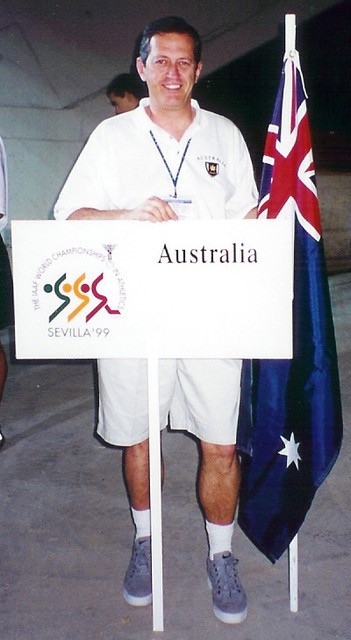 Peter Brukner’s involvement with Athletics Australia began through providing medical support to its athletes at Olympic Park Sports Medicine in Melbourne but his interest was always much broader than simply in sports medicine.
Peter Brukner’s involvement with Athletics Australia began through providing medical support to its athletes at Olympic Park Sports Medicine in Melbourne but his interest was always much broader than simply in sports medicine.
His practice’s proximity to the then major competition venue in Melbourne provided the opportunity not only to advise and treat athletes in their “working” environment but also for Peter to develop a greater first-hand appreciation of and interest in the sport.
In due course Peter put up his hand to be a team official at a time when all roles were fully voluntary.
As a team doctor Peter was well planned and methodical, bringing to the role full time expertise in sports medicine. He also believed in athletics sections being internally staffed within Games’ teams rather than relying on headquarters support for each of the medical roles. This was partially achieved in 1994 and more fully by the time of the 1996 Olympic Games in Atlanta when Peter served in the dual role as section assistant manager/doctor with a full quota of three physios and three massage therapists.
Peter was also team doctor for the 1991 and 1995 world championships and for the Oceania team to the World Cup in Cuba in 1992.
The experience of the support management role in 1996 encouraged Peter to consider taking on more specific management positions from then on. After serving as assistant manager without any additional medical duties for the Commonwealth Games in Kuala Lumpur in 1998, Peter was ready to take on the lead role.
His first appointment as team manager took him to the 1999 World Championships in Seville (Spain) followed by the Australia v South Africa Test Match in Johannesburg early 2000 ahead of the same role for the Olympics Games in Sydney later that year.
As is par for the course in the team manager role, each of those teams provided their challenges but Peter’s ability to remain calm and consistent, even when things were sure to have challenged him, was an obvious feature of his leadership. His performance as a team manager in Sydney 2000 was particularly outstanding – handling a whole host of unique expectations and limitations occasioned by a home Games.
The intricacies of international travel and time zone changes might have been gone but to the fore came many other issues, not the least being team members worrying about whether their family and friends could be part of it all.
The issue of marching in the opening ceremony became a matter of much stress within the athletics section when the Australian Olympic Committee advised that not everyone would be able to take part. Most team members found this hard to accept especially given it was a unique opportunity “at home” and because athletics did not begin until the second half of the Games.
Peter did his best to manage expectations whilst quietly advocating for a different position from headquarters. His approach worked and by the time of the ceremony everyone who wanted to march did exactly that,
Peter was decisive and produced protocols that were clear and simple for his colleagues to follow and implement. He was very much in favour of producing the best team environment within which good performance outcomes could flow. At the same time when necessary he was not averse to reining in over-zealous or unprofessional behaviour.
Once the team manager, Peter avoided involvement in the work of the medical personnel but was always available to provide support if his considerable knowledge and experience might assist. Peter’s trademark activity for each team was to organise and provide the questions for a trivia night. Peter continued his interest and involvement in athletics as a national selector from 2004.
Peter served two terms as president of the Australasian College of Sports Physicians, is the co-author of the ‘bible’ of sports medicine Brukner & Khan’s Clinical Sports Medicine. He is the founder of the SugarByHalf campaign and recently authored the popular book A Fat Lot of Good.
Peter was awarded the Medal of the Order of Australia in the 2006 Queens Birthday Honours List for service to sports medicine, particularly through the Australasian College of Sports Physicians, and as medical adviser for sporting organisations of which AA was one of the most to benefit.
Peter’s role as a team manager and medical officer was crucial as athletics teams transitioned from exclusively voluntary management to a more hybrid model.
LYNDA GUSBETH (VIC)
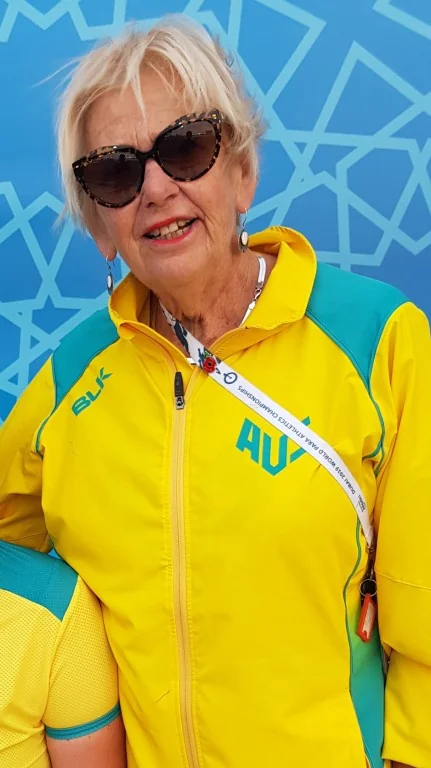 Lynda Gusbeth’s involvement in athletics has been highlighted by a willingness to take on new roles with a fearless determination to make things better for the sport. In both her professional roles as a schoolteacher and principal and as Athletics Australia’s integrity officer as well as in numerous voluntary capacities she has made a difference.
Lynda Gusbeth’s involvement in athletics has been highlighted by a willingness to take on new roles with a fearless determination to make things better for the sport. In both her professional roles as a schoolteacher and principal and as Athletics Australia’s integrity officer as well as in numerous voluntary capacities she has made a difference.
First registering as an official with Athletics Victoria in 1994, Lynda made immediate contributions to her club – Deakin Athletics and at state and national level both in school and mainstream athletics.
After Sydney was awarded the Olympic and Paralympic Games, AA was particularly keen to use the opportunity to encourage more female officials to take on key roles in competitions. Lynda took up the challenge, achieving AA’s highest level of qualification in both throwing and jumping events.
She was appointed as a throws judge for the 1996 World Under 20 Championships in Sydney and within four years was ready to accept the roles of throws chief judge for the Olympics and as throws referee for the Paralympic Games.
Her knowledge of the rules and their application were first-class but even more valuable was her capacity to manage events in a way that provided the best environment for the athletes taking part.
Further opportunities as a high-level technical official followed with appointments as a throws chief judge to both the Goodwill Games and IAAF Grand Prix Final in 2001 and as throws referee for the 2004 Oceania Championships and the 2006 Commonwealth Games.
Meanwhile Lynda was making a substantive contribution in school sport. From 1994 to 2001 she was a team coach for the Victorian team competing in School Sport Australia national events before taking over as team manager for the next three years.
In 2004 Lynda grasped the opportunity to move into administration as competition co-ordinator for the Pacific School Games held in Melbourne at the end of 2005. This entailed responsibility for the planning, resourcing, budgeting and delivery around the multi-sports competition – athletics, swimming, diving and basketball including para-components in all sports. She led working party teams in coordinating sport operations, event delivery, risk management and end-of-project reporting as well as management of competition operations, entries, protest and drug testing procedures for all sports.
It was a project dear to Lynda’s heart having been a Victorian team coach at the 1996 Perth and 2000 Sydney editions of the Games and team general manager to Canberra in 2008. International experience followed in 2009 as tour manager for the Australian team participating in the World School Summer Games in Qatar.
This involvement opened a new possibility for Lynda soon after when AA found the perfect niche for her in its international touring program. She served as assistant team manager for the Para World Championships in 2011, 2013 and 2015 and the Paralympics in London – developing an exceptional relationship with team members through her many skills, not the least of which was her knowledge of the technical rules when protests and appeals came into play.
Lynda’s involvement continued – now as team manager – for two more Para World Championships (in 2017 and 2019), two more Paralympics (2016 and 2020/21) and for the 2018 IAAF World Under 20 Championships.
When in December 2013, AA detected the need for a part-time staffer to work in its Integrity Unit as its education officer, Lynda was an ideal choice, having recently retired from teaching. The extension of whereabouts reporting had created some uncertainties amongst the much larger cohort of Australian athletes who were required to comply.
Lynda’s calm and considered approach with the required attention to detail provided education to the athletes about what was required and how that was to be achieved. But she was prepared to go further in terms of the service, monitoring reporting dates and individually reminding athletes when they needed to act. As requirements increased with broader education necessary in the areas such as fair play and match-fixing as well as in anti-doping, Lynda’s remit expanded – always with professionalism and required level of detail. It has been a critical role in the new age of athlete compliance obligations.
During this work Lynda connected with many more athletes, leading her to also become a confidente to those experiencing difficulties and a member protection information officer (MPIO).
Lynda is a life member of Deakin Athletics and received School Sport Australia’s Track and Field Service Award in 2004.
DES JOHNSTON (QLD)
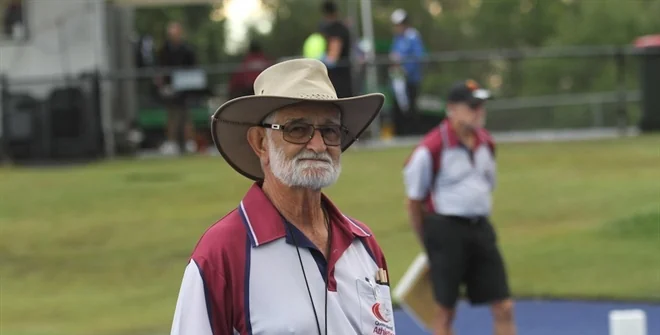
At the 2021 Queensland Athletics annual general meeting, its long-standing president Des Johnston, announced he would be standing down from the role but to the relief of many, Des has remained on the board and continues to offer advice and assurance to his fellow board members.
Des was first elected as a board member of QA in 2011 and soon after, in early 2012, after the tragic loss of his good friend and then president, Reg Brandis, was elected as the Association’s president.
At that time the membership of QA was around 4,800. Nine years on – the number was almost 15,000 with the State now leading the national figures. There had been significant increases in participation in shield meets and championships and QA is in a sound financial position. The association is very active in the recreational running space with the innovative Qrun program. As president, Des led a Board that was focused on the best outcomes for athletes.
Significantly, the once fractured relationship with Athletics North Queensland became a partnership based on trust and common goals for our sport.
Des led and worked with the Board to implement several successful projects. The first, and perhaps most critical, was to unite what had been at times a divided association, the relationships are not only vastly improved but arguably demonstrate the best practice example of how the diverse needs of regional and metropolitan athletics can work together for the greater good.
The always approachable Des can be seen on the track officiating most weekends in the summer and at cross country during the winter. He received AQ Merit Award in 2014 and AA’s silver award for 20 years service as an official and administrator the following year.
Des started his career in athletics whilst still a Queensland schoolteacher – a profession in which he proudly worked in from 1960 through until his retirement in 1997. As a well-known schoolteacher in the Ipswich area, Des contributed to School Sport Queensland over a 30-year period.
During that time Des was a coach and manager for Queensland Primary School teams travelling to Australian Championships from 1968 through to 1996. His commitment to school sport was legendary in his home State where he was the chair of Queensland Primary School Track and Field from 1992 until 1996.
He also brought his considerable skill to assist in administration, ultimately to act as chair of Queensland Primary Track and Field Championships from 1990.
With the Sydney Olympics on the horizon, the late 1990s also saw Des turn his attention and skills to officiating, ultimately achieving AA’s highest grading level as a track official. He was quickly recognized and was appointed as a technical official at the 2000 Games.
Des has also played an ongoing and significant role at many national championships where he is highly regarded not only for his own skills but for his commitment to mentoring others and in particular guiding newcomers to the national scene.
In addition to being an umpire at the Sydney Olympics and Paralympics, his abilities continued to be recognised through appointments to the 2001 Goodwill Games (as assistant chief umpire) and 2004 Oceania Championships (assistant track referee).
There were also key roles at the 2006 and 2018 editions of the Commonwealth Games as assistant chief umpire and assistant outside events referee.
Twenty year later, Des continues significant contributions in officiating, turning out like clockwork at club and school meets. Often seen in the role of track referee, Des’ calm and friendly manner is particularly appreciated by athletes.
At national level, Des has made substantial contributions both as an administrator and technical official.
As Queensland president and delegate to AA, his quiet and patient approach has always been considered and valuable.
Des has been a major contributor to all aspects of our sport from the grassroots to national and area level for over 50 years and has the absolute respect of his peers. Not surprisingly perhaps he was chosen to take the oath on behalf of all technical officials across all sport at the opening ceremony of the 2018 Commonwealth Games on the Gold Coast.
ANNE LORD OAM (VIC)
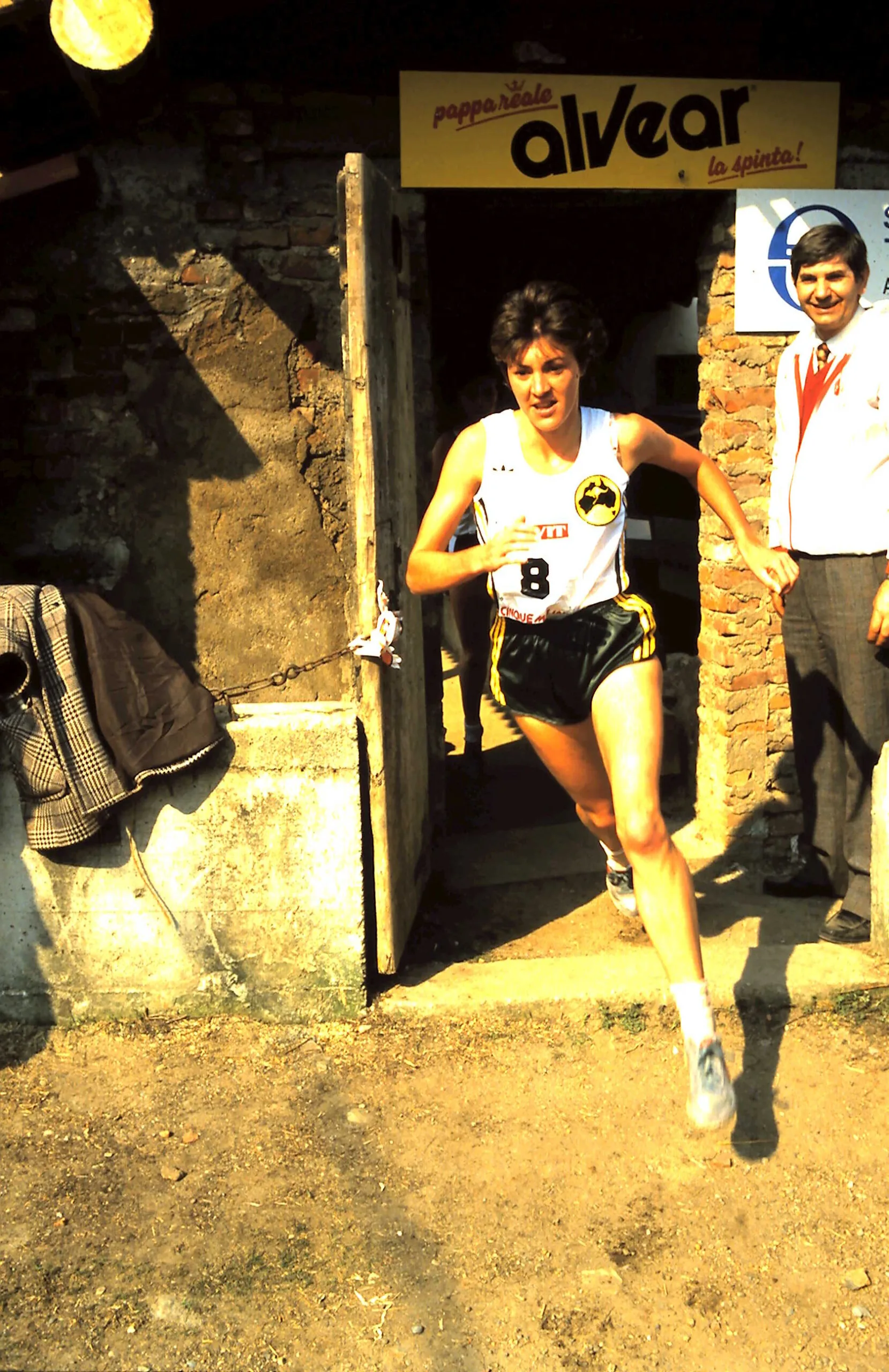 Anne Lord “graduated” from an impressive career as an athlete to find a real niche in administration of athletics – of which her country, her continental association and World Athletics have been substantial beneficiaries.
Anne Lord “graduated” from an impressive career as an athlete to find a real niche in administration of athletics – of which her country, her continental association and World Athletics have been substantial beneficiaries.
She was five times a national junior champion across both track and field and cross-country before moving to senior ranks and becoming national champion on two occasions – over 10km on the road and at 3000m on the track.
She was probably most at home, however, in cross country representing Australia at the World Cross Country Championships four times between 1981 and 1987 complemented by a single appearance at the Women’s World Road Championships in 1991. She retired with personal bests of 3000m (9.25.79), 10000m (34.02.0), 15km (54:53) and half marathon (75:19).
Anne then turned her hand to team management combining her by then vast experience as an athlete on tour with her professional skills as a physiotherapist. She was either manager or team physio for 16 major national teams from 1992 to 2010 – including on seven occasions at her beloved World Cross Country. This contribution also extended to two Commonwealth Games and the 2000 Sydney Olympic teams.
Her “athlete first” approach and her high levels of planning were greatly appreciated.
Anne had further opportunity to influence the world of cross country upon her election in her own right to the IAAF Cross Country Committee in 2007, serving as the Oceania representative until 2019 when all IAAF committees were wound up upon the transformation to World Athletics. She was meticulous in her reporting to Oceania Athletics and always keen to consult widely within the region before Committee interactions.
Anne was always one of the more active members of the Committee pushing for innovation and better promotion of the discipline. One of her last contributions was to successfully work for the return of the Championships to Oceania for a second time. Whilst the Bathurst edition has regrettably now been twice postponed due to the pandemic – when it is eventually staged, hopefully in February 2023, much of its eventual success will be due to Anne’s foresight and drive, alongside a continuing contribution.
Anne’s quiet and unassuming style of leadership can be somewhat misleading. Her achievements as president of Athletics Victoria (from 2005 to 2011) and her nine-year contribution on the board of Athletics Australia (from 2011 to 2020) have been substantial.
During her time on the AV board and her period as its president Anne demonstrated her ability to balance a steady hand with a willingness to innovate. Her understanding of and connection with the volunteer base provided an excellent framework for the sport to move forward whilst respecting its foundations.
Whilst on the AA board, Anne served as chair of its nominations committee as well as numerous roles in other board projects and ad hoc committees. Before that time in 2003, she became chair of AA’s Out of Stadium Committee of which she was a long term and passionate member.
Her collaborative and harmonious approach enabled reform and progress to be made in many areas – always encouraging, in particular, other women to step into officiating, coaching, administrative and leadership roles.
Anne was also passionate about re-engaging the sport’s alumni in various ways and also including her role as chair of Athletics Australia’s Special Awards Committee, about the recognition of others for their contributions to the sport.
Although Anne has concluded her terms on those bodies where she has made the most impact, she continues to take a broad interest in the sport, offering to assist where she may be able to make an impact and always to do the “mundane” things that keep the sport ticking along at club and grassroots level.
Anne received the Medal of the Order of Australia in June 2015 for her contribution to athletics at all levels as a competitor and administrator.
NICK MOORE (NSW)
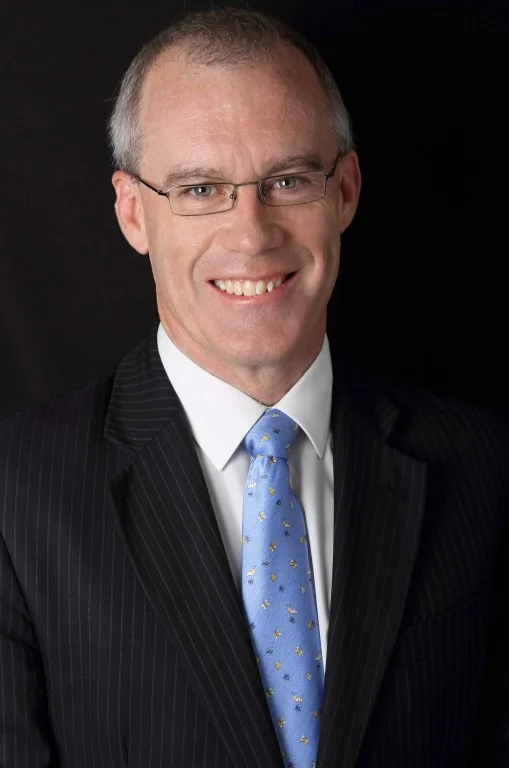 Nick Moore’s love of athletics from an early age has not only delivered an enduring career as an active athlete for more than 40 years but has led to high quality contributions in the sport’s administration.
Nick Moore’s love of athletics from an early age has not only delivered an enduring career as an active athlete for more than 40 years but has led to high quality contributions in the sport’s administration.
That already four-decade involvement began in Nick’s primary school years with Randwick Botany through which he engaged in the sport at club and state level through little athletics up to his sub-junior years. He was active and successful as a schoolboy winning the GPS under 16 800m for St Josephs Hunters Hill in 1976.
Not surprisingly, Nick joined its famous athletics club upon commencing his tertiary education at Sydney University in 1979 – competing for Sydney University AC from then until 2008 in interclub, state relays, state championships, road relays, cross country and masters. He was a club champion and represented at Intervarsity on four occasions, being part of the winning 4x400m team in 1984.
At masters’ level, Nick was Australian masters’ champion over 800m in 1994 and 2001 and was a World Masters 800m semi-finalist in Brisbane in 2001.
As a member of SUAC until now, Nick has contributed to its growth and development over several decades to become one of the strongest athletics clubs in Australia as secretary/treasurer (1979 – 1981) and competition and interclub manager (1982-1990). As president during the Olympic lead-up period from 1991 – 2000, he drove significant change in governance, competition, membership, fundraising and major events, as well as representing SUAC as a delegate to Athletics NSW.
Nick received the Sydney University Gold Award in 1998 for significant contribution to athletics. Since 2001 he has been, and remains, a SUAC vice president, supporting its activities and acting as a mentor to club members and athletes.
When Athletics Australia was awarded the 1996 World Under 20 Championships in Sydney, Nick was appointed as venue manager – a significant test event for the Sydney 2000 Olympic Games. His roles and responsibilities included planning, preparation and management of all athlete activities at SOPAC for athletes from 165 countries, including warm up facility, competition venue, access and logistics as well as working with SOPAC staff to ensure adequate security and accreditation-checking processes for athletes, coaches, officials and spectators, including the management of mixed zone and media, and management of VIP areas.
For the Sydney 2000 Olympic Games, Nick was a member of the results team – working all days at the main stadium with responsibility for verifying and approving results directly from photo finish and prior to publication on the stadium scoreboard.
Nick later resumed his involvement with little athletics from 2010 to 2014 as centre manager for Eastern Suburbs LAC and as a committee member responsible for organising and conducting weekly competition for up to 500 little athletes at Trumper Park, Woollahra Oval and ES Marks Field including equipment, organisation of volunteers, competition program, event management, health and safety, representative events and awards presentations.
Nick was elected as board member of Athletics Australia in 2006, serving the maximum possible three terms of three years ending in 2015 and as a vice-president from 2010. He represented AA as its delegate to the Australian Olympic Committee and was chair of its Coaching Advisory Committee responsible for the development of a new coaching framework for athletics in cooperation with the Australian Track & Field Coaches Association and the Australian Sports Commission.
He contributed to AA policy development in a range of areas, represented AA in merger discussions with Little Athletics Australia, laying the foundation for long term cooperation between the two organisations and chaired AA’s selection policy committee, working with the board, selectors and the high performance team and athletes to develop a new selection policy following the London 2012 Olympics.
He made the commitment to represent AA in a formal capacity on many occasions, particularly at athletics competitions and official event.
MARIAN O’SHAUGHNESSY (VIC)
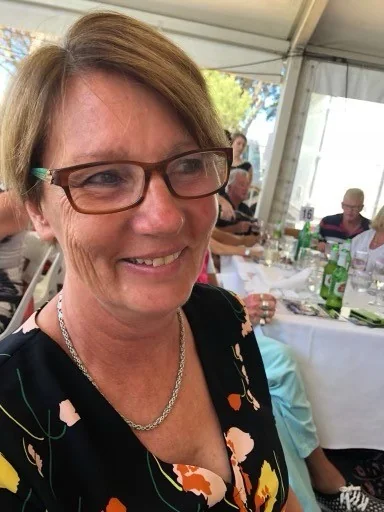 Marian Fisher was a trailblazing athlete who, through an unhelpful alignment of the planets, missed selection for Commonwealth and Olympic Games teams and had retired before the world championships came into being.
Marian Fisher was a trailblazing athlete who, through an unhelpful alignment of the planets, missed selection for Commonwealth and Olympic Games teams and had retired before the world championships came into being.
Marian was most adept at the 400m hurdles, an event which did not achieve complete international recognition until the first world championships in 1983. Yet she became both the first Australian champion in the event (at the 1976 Nationals) and the first Australian to win in international competition (at the 1977 Pacific Conference Games).
When she did have the opportunity to represent Australia, Marian had some excellent results. At the 1977 edition of the PCG in Canberra she won three gold medals (in both relays as well as the hurdles) and a bronze over 400m. At the 1981 edition (then competing under her married name of O’Shaughnessy), there was again gold in the 4x400m and another bronze in the 400.
She represented Oceania at the World Cup in the 4x400m relay on three occasions – 1977, 1979 and 1981.
Marian had a fine record in the Australian championships – thrice national champion in the 400m hurdles (1976-77-78) and once at 400m (1977) over which distance she was third in 1978. She retired with personal bests of 200m (23.3), 400m (51.9) and 400mH (57.28).
Maintaining her passion for athletics, Marian found the time away from her profession as a teacher (including for many years at Cheltenham Secondary College) to coach both in the school system at Xavier College and Caulfield Grammar and now in club-land at Sandringham where she specialises in steeplechase.
In administration she played an active role on Athletics Victoria’s summer competition committee, including as its chair but without question Marian’s greatest contribution in this regard has been through Athletics International – Athletics Australia’s kindred partner for its alumni.
Marian first joined the AI committee in the late 1970s and then again when AI was re-started in 1995. She was elected vice president in late 2011 and then to the presidency from December 2012 – to current.
Her experience on a variety of AV committees, prior to joining and whilst on the AI Committee, provided Marian with valuable relationships within AV which were particularly helpful when organising AI functions with which she was very involved and played a key role in both raising the funds crucial to AI’s work and in maintaining connections with its members and those eligible to join.
Marian has always been keen to ensure the “right” athletes receive the grants AI is able to award each year to assist in their onward career development. She accesses her background in mathematics to set up detailed spreadsheets to calculate the ranges around the relevant qualifying times, in turn to be used to identify potential recipients and suggest priority orders.
Marian is a great supporter of developing athletes, strongly believing they need all the help they can get to “make it”. An example would be after all AI grants had been allocated for the year, she was totally supportive of finding some additional money to support Ash Moloney, after he asked if there was any way AI could help him purchase some additional vaulting poles for training and competition after he exhausted his existing supply before the stunned eyes of the fans at the Oceania Championships. He has proven to be the “right” athlete in a very short space of time.
Marian was one of the regular mentors in the AI/AA Mentor camps held at the AIS. When this program was completed, the available AI funds were re-directed more to grants and scholarships.
She regularly flies the flag for AI at the Nationals – both open and under-age and whilst there, to present AI’s annual awards and scholarships. She has been a strong supporter of the advent of the Betty Cuthbert Medal and has served as a voting panel member.
Particularly with the support of her close AI colleagues, Lynne Williams, Terri Cater, Charlene Rendina and the late Maxine Corcoran, Marian has continued to grow AI and its relevance, encouraging membership activities outside its home base in Victoria and “reunions” at national level meets.
Marian’s achievements and service to her sport as an elite athlete, coach and administrator – and particularly her work with Athletics International to provide support and encouragement to the next generation of stars are outstanding.
TIM O’SHAUGHNESSY (VIC)
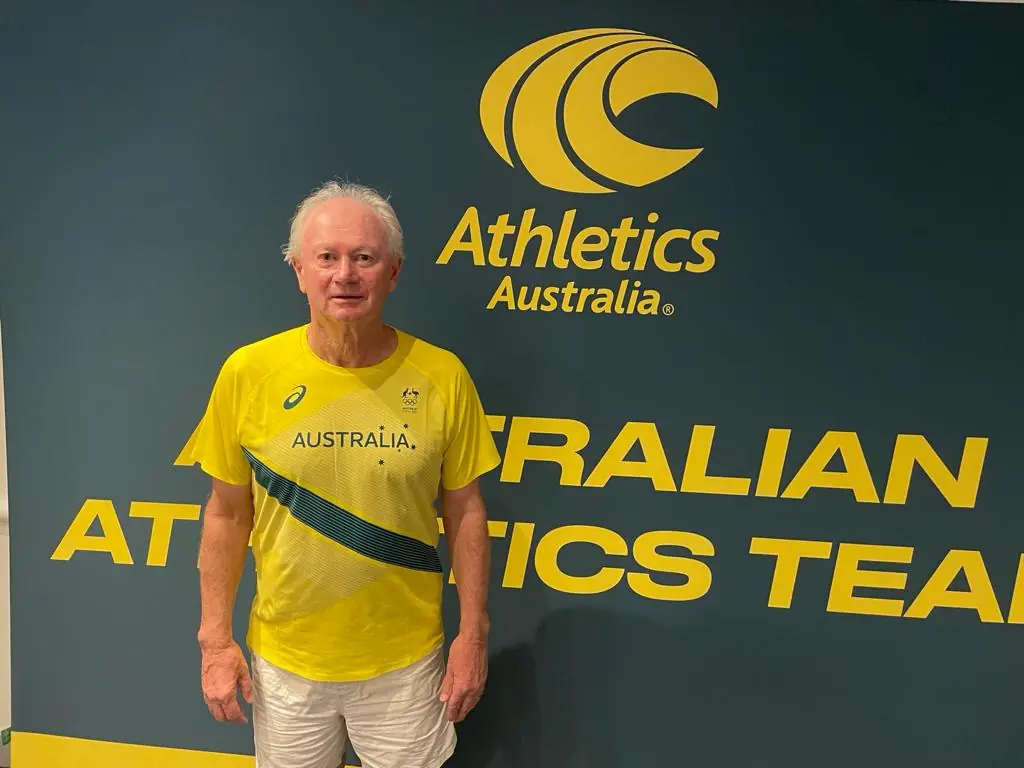
Tim O’Shaughnessy was touted as a prodigious middle-distance talent as a junior and was a successful schoolboy athlete.
He finished second to now Athletics Australia life member Steve Stingemore in the under 19 1500m at the 1971 Nationals before reversing the result in Perth a year later in a near dead-heat. Later there were bronze medals at senior level in the 1500m on the track in 1976 and over 12000m in cross-country in 1981.
Cross country became Tim’s passion and he represented Australia twice in the World Championships in that discipline – in 1977 and 1981, finishing mid-field on both occasions. He retired with personal bests of 1500m (3.41.8), 2 miles (8.40.0) 5000m (13.47.0) and 10000m (28.53.4).
Tim may have been passionate about his own participation in school athletics but even more so for the generations who have followed, particularly in Melbourne’s famed APS competition, national schools’ knockout and all schools championships both in track and field and cross country.
He not only instills a love of athletics in teenage participants but provides them with the skills, training programs and camps to give them the best chance of taking their involvement in the sport as far and for as long as possible along whatever pathway they may choose.
For those, particularly in distance events, who continue on, Tim’s next major influence is via his commitment to Falls Creek in January providing guidance to newcomers and returnees alike to find accommodation, the most appropriate training groups and activities whilst there.
Tim was a teacher at Melbourne Grammar from 1990 to 2006 before taking up a position on the Athletics Australia staff as distance running co-ordinator until 2012. In neither role was Tim a school or office hours kind of guy – dedicating hours of his own time in the evenings and weekends to coach and provide whatever advice might be sought. It has never mattered to Tim how good the athlete was – simply if they want to have a go, he’ll give them a hand.
Tim’s qualities have made him an ideal national team official over the past 15 years. He is particularly athlete-focussed but his planning is always objectively sound and methodical.
He has been a team coach at two Olympic Games (2008 and 2020/21) and for the 2006 Commonwealth Games. He served as a team coach and as assistant team manager respectively for the 2007 and 2009 World Championships.
He is always effective and supportive in his roles but perhaps even more so when in leadership roles as team manager for four consecutive World Cross Country Championships from 2007-10, returning in a coaching role in 2019. There were also management and coaching roles with the then highly regarded Chiba Ekidens in 2006 and 2007.
Tim has long been an outstanding contributor to Australian sport mainly including triathlon and Australian Rules football but most notably in athletics, coaching for more than 40 years. He is one of those people who always has time for others. He is an outstanding listener and has a special ability to read people and situations.
He is also possessed with a terrific sense of humour which makes him always great value and company in any group situation – almost a rigid requirement to succeed as an international sports person from Australia.
Tim is a willing and much sought-after mentor and advisor to other coaches. He has been Wesley College’s head coach for athletics and track and field since 2009 and an assistant coach with Melbourne Track Club from 2004. He also coached Old Xaverians to three VAFA A grade AFL premierships and was Collingwood’s physical performance advisor when they won the AFL premiership in 1990.
He served on AA’s Distance Running Commission and more recently he has joined the board of Sandringham Athletics Club 2021.
In all Tim has coached for over 40 years – guiding the Wesley women's athletics team and cross-country team to APS championships seven years in a row and acting as personal coach to numerous individual champion athletes.
Dr RD (DICK) TELFORD AM (ACT)
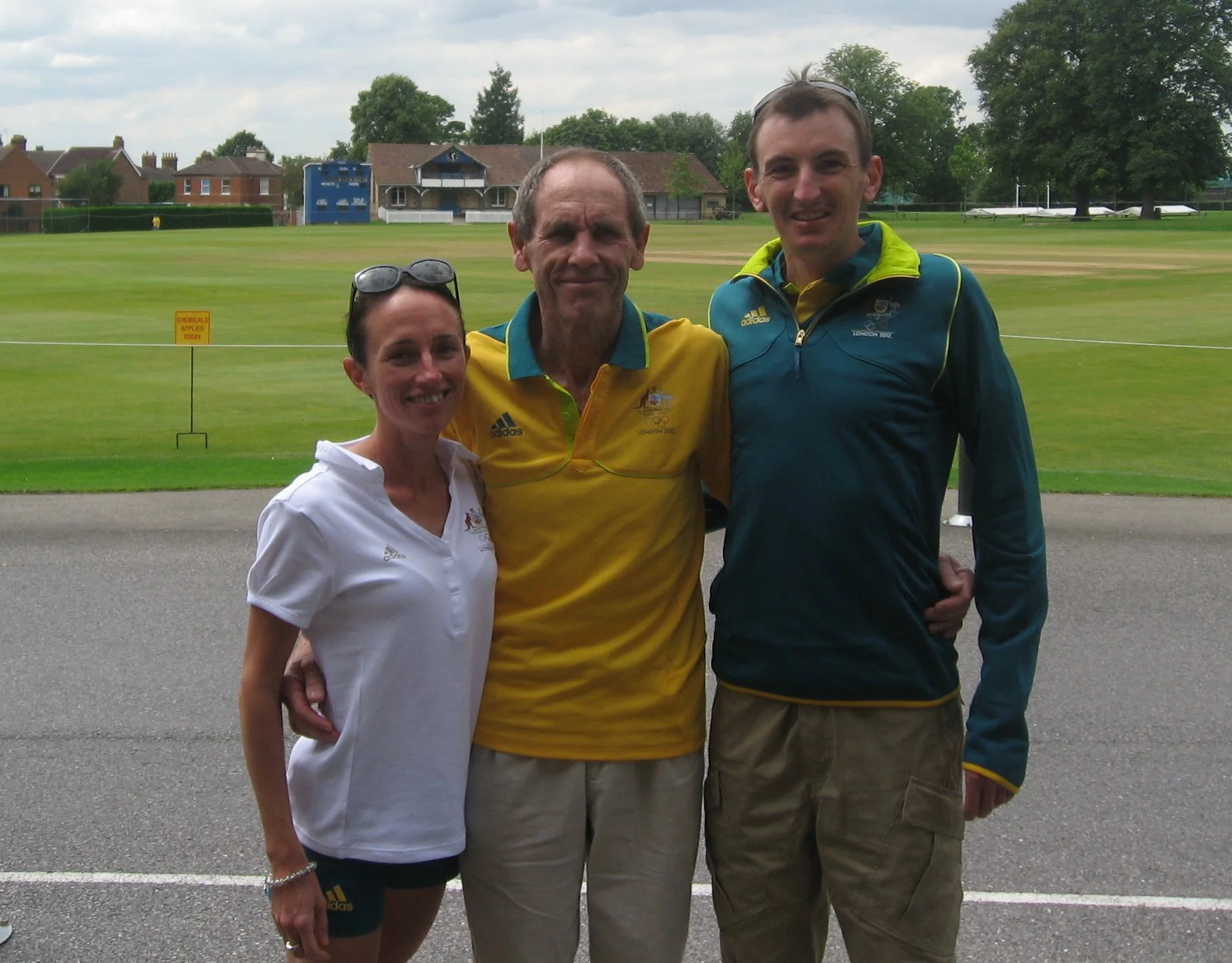
Neither Dick Telford’s youth nor early adult years included an involvement in athletics but there is no question that changed significantly and very much so f

